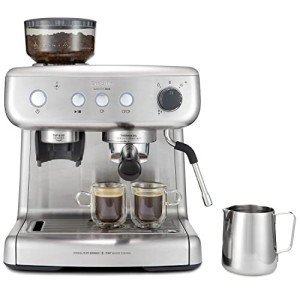10 Mobile Apps That Are The Best For Commercial Espresso Machines
The Rise of Home Espresso Machines: A Comprehensive Guide
As coffee fans continue to look for fresh and delicious brews at home, the appeal of home espresso machines has actually surged in the last few years. No longer simply the domain of cafes and cafe, these machines empower individuals to craft barista-quality espresso drinks from the convenience of their kitchens. This short article will check out the various kinds of home espresso machines, their features, and considerations for selecting the ideal one. Additionally, it will offer a choice of FAQs to assist potential buyers make notified choices.
Kinds Of Home Espresso Machines
Home espresso machines can be classified into numerous categories based on their systems and user-friendliness. Professional Espresso Machines has its unique features, pros, and cons.
Type
Description
Pros
Cons
Manual Espresso Machines
Needs the user to by hand control the brewing procedure, involving techniques like pulling a lever to produce pressure.
- Complete control over developing process
- Compact style
- Requires skill and practice
- Time-consuming
Semi-Automatic Machines
Machine automates water circulation and pressure, but the user still controls the dosing and period of the brewing process.
- Balance of automation and control
- Versatile
- Learning curve for perfecting methods
Totally Automatic Machines
Automates the entire brewing procedure, from grinding to developing, often with programmable settings for tailored drinks.
- Extremely user-friendly
- Quick and practical
- Less control over the brewing procedure
- Higher cost point
Pill or Pod Machines
Uses pre-packaged espresso capsules or pods to create coffee quickly and easily.
- Extremely easy to use
- Minimal clean-up
- Limited flavor variety
- More costly per cup than ground coffee
Super-Automatic Machines
Combines functions of totally automatic machines with built-in mills, permitting users to brew entire bean espresso and milk-based beverages with one touch.
- All-in-one benefit
- Ideal for milk-based drinks
- Often the most costly
- Can be large
Functions to Consider
When selecting a home espresso machine, potential buyers must consider the following functions to ensure they pick a machine that meets their requirements:
Grinder Type:
- Built-in mills can offer fresher grounds but might need more upkeep.
- Different mills allow for more personalization of grind size.
Pressure:
- Look for machines that produce a minimum of nine bars of pressure, which is ideal for brewing espresso.
Water Temperature Control:
- Machines with adjustable temperature level settings permit much better extraction of taste from beans.
Milk Frothing Options:
- Consider whether you want a manual steam wand for frothing or an automatic milk frother for benefit.
Relieve of Cleaning:
- Machines with removable parts and self-cleaning functions substantially reduce clean-up time.
Size and Design:
- Ensure the machine fits comfortably in your kitchen area and lines up with your visual choices.
Budget:
- Set a budget before beginning your search, as costs can range substantially from affordable designs to high-end machines.
Benefits of Home Espresso Machines
Owning a home espresso machine provides various advantages:
- Cost-Effective: Over time, brewing espresso in your home can save coffee lovers money compared to frequent café visits.
- Modification: Users can try out different beans, grind sizes, and developing strategies to find their perfect cup.
- Convenience: The capability to brew espresso whenever eliminates the requirement to go out to a café, specifically advantageous throughout late nights or mornings.
- Quality assurance: With a home machine, individuals have total control over the quality of components and developing processes.
Disadvantages of Home Espresso Machines
Nevertheless, there are some disadvantages to consider:
- Initial Investment: High-quality espresso machines can be pricey, requiring a substantial in advance investment.
- Learning Curve: Mastering the art of espresso developing can take some time and practice, which might be frightening for beginners.
- Maintenance: Like any home appliance, espresso machines require routine cleaning and upkeep to guarantee optimal efficiency.
Frequently asked questions
1. What is the best type of home espresso machine for novices?
Answer: For novices, a semi-automatic machine is typically suggested as it offers a balance in between control and automation, allowing you to learn the basics without overwhelming complexity.
2. How much should I invest in a home espresso machine?
Answer: Entry-level machines can start around ₤ 100 to ₤ 300, while higher-end designs can vary from ₤ 500 to over ₤ 2000. It's vital to set a budget based upon your anticipated use and wanted functions.
3. Do I need a different grinder?
Response: While some espresso machines come with integrated grinders, investing in a separate grinder allows for higher personalization and guarantees better quality grounds.
4. How frequently should I clean my espresso machine?
Answer: Cleaning frequency can differ by machine type, but it's generally suggested to clean up the machine after each use and perform deep cleanings weekly or regular monthly, depending upon use.
5. Can I make milk-based drinks with any espresso machine?
Response: Not all machines feature milk frothing capabilities. If you delight in beverages like lattes or coffees, look for a machine with a steam wand or automatic frother.
Home espresso machines are changing the way coffee aficionados enjoy their precious brews. With numerous types and advanced features offered in the market, there is something for everyone. Whether it's the pleasure of creating distinct recipes or simply appreciating the ideal shot of espresso, buying a home espresso machine can improve both the coffee-drinking experience and the lifestyle for coffee fans everywhere. Just like any investment, it is essential to weigh the advantages against the possible disadvantages and choose a machine that perfectly fits both your lifestyle and preferences.
